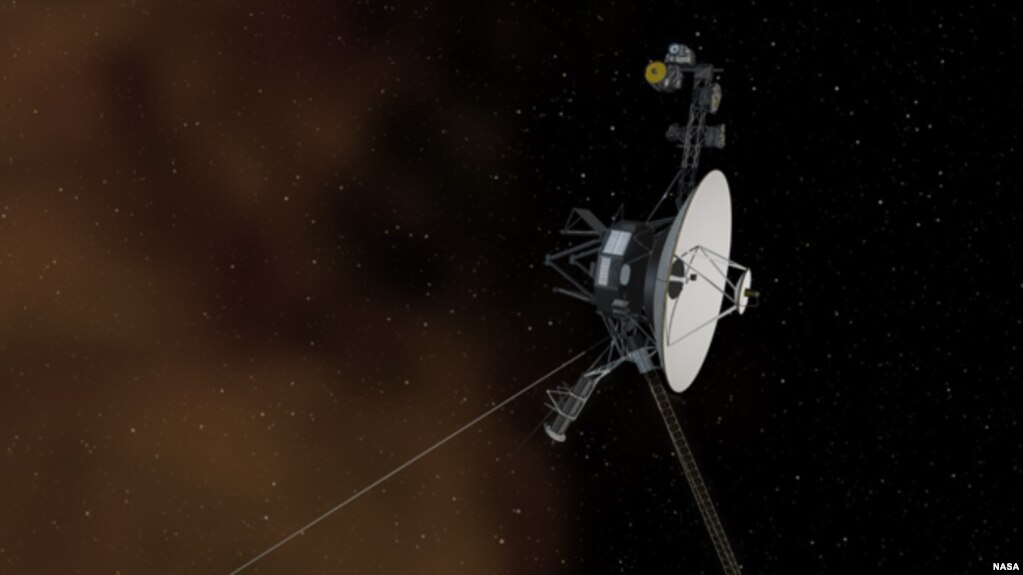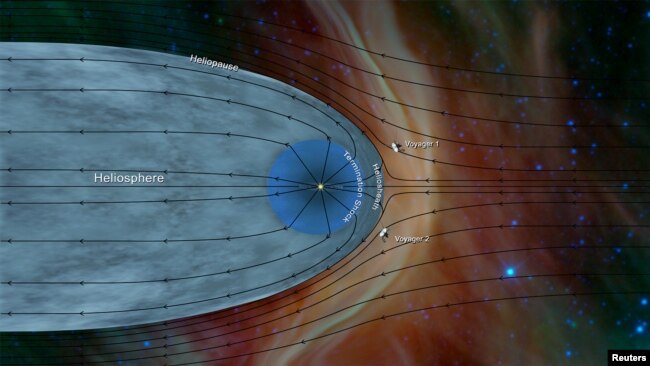世界共通言語は、英語ですよね。
よほどの地球の果ての田舎に行かない限り、コミュニケーションが取れます。
地球上で一番簡単な言語だと思います。
そこに今回のこのタイトルから、あ~そうか!!そこね!!
でも、こんなことが議論される時代まで来たのかと思わされましたね。
まず浮かんだのは、エスペラント語、国際手話でした。
ご存じでしたか?
早速、聞いて、読んでみましょう!!
- 未来の宇宙旅行,言語コミュニケーション問題を引き起こす可能性
- 言語の共通化ー
- 手話について
- How Future Space Travel Could Create Language Communication Problems
- Words in This Story
未来の宇宙旅行,言語コミュニケーション問題を引き起こす可能性
How Future Space Travel Could Create Language Communication Problems
科学者や技術者たちは、遠い将来、星間空間(星と星の間の領域)への旅行の可能性に備えて準備を進めています。
新しい報告書は、長期の宇宙旅行で言語が変化する可能性のある問題を調査しています。
地球からの探査機が、星間空間として知られる神秘的な領域に到達したのはわずか2機だけです。科学者たちは、星間空間を、太陽によって作られた粒子や磁場の領域の外側の領域と特定しています。
専門家は、この未踏の宇宙空間に人間を送るための技術や機器が開発されるまでには、おそらく何年もかかるだろうと考えています。しかし、もしそれが実現すれば、巨大な宇宙船が人間を遠くの星への長期旅行に運ぶことができでしょう。
2人のアメリカ人研究者は、そのような旅行で起こりうる問題を探ってきました。彼らは、人間の言語の変化が時間の経過とともに発展し、地球上の人々との大きなコミュニケーションの問題につながる可能性を考えたのです。
(写真)
NASAの宇宙船「ボイジャー2」のデータは、NASAが公開したこの画像に描かれているように、太陽系の境界まで伸びる太陽の風によって作られた風袋状の領域であるヘリオスフィアの構造をさらに特徴づけるのに役立っています。
言語の専門家は、カンザス大学のアンドリュー・マッケンジー教授とサザンイリノイ大学のジェフリー・プンスキー教授。2人は最近、このテーマに関する論文を発表し、欧州宇宙機関(ESA)のオンライン出版物 Acta Futura に掲載されました。
この論文では、地球から約180億キロと推定される星間空間に到達するために必要な非常に長い旅について考察しています。また、将来の遠い星の植民地化の可能性についても考察しています。
研究者らは論文の中で、共同体が互いに孤立していくにつれて、言語は自然に変化していくと指摘しています。コミュニティが長い間孤立していると、故郷に戻ってきたコミュニティのメンバーが理解できなくなるほどの言語の違いが生じる可能性があるのです。
マッケンジー氏は声明の中で、「もしこの宇宙船に10代で乗っていれば、新しい概念が出てきて、新しい社会問題が出てきて、それについての話し方が生まれてくるだろう」と述べています。そのような固有言語はその宇宙船だけの特異なものになるでしょう。
"地球上の人々は、彼らに伝える理由がない限り、これらの言葉を知ることはないかもしれません。そして、遠くに行けば行くほど、故郷の人々と話すことは少なくなるだろう」とマッケンジー氏は語った。
研究者たちは、新しい言葉が使われることに加えて、宇宙船で旅をしたり、コロニーに住んでいる人たちの言語は、他にも多くの変化を経験するだろうと指摘しています。
例えば、異なる文字の音は時間の経過とともに変化し、個々の単語だけでなく、全体の”文法システム”にも影響を与える可能性が高い、と論文は述べています。
単語や文構造の大きな変化は、時間の経過とともに体系的な言語の壁を生み出すかもしれない、と研究者らは述べています。マッケンジー氏は、「より多くの時間が与えられれば、新しい文法形式が現在のものに完全に取って代わる可能性があります」と述べています。
(写真)
NASAのハッブル宇宙望遠鏡が、タランチュラ星雲の一部をアップで撮影しました。このイオン化水素ガスの星形成領域は、天の川銀河の隣にある小さな銀河、大マゼラン星雲の中にあります。(NASA/ESA)
この論文では、時間の経過とともにコミュニティが孤立していったために、どのようにして言語が地球上で発達していったのかという例を示しています。例としては、"遠く離れた太平洋の島々のポリネシア人の入植や、比較的孤立したヨーロッパの植民地での方言の発達 "などが挙げられています。
マッケンジー氏は、近代に地球上で起こった言語の大きな変化の例を挙げています。彼は、話し手が上昇音で発言を終了する、”アップトーク”と呼ばれる話し方を説明しています。彼によると、この話し方は、それに気づかない人には質問の口調と間違われることが多い、といいます。「アップトークは、過去40年の間に発生していることが確認されただけですが、アメリカ人やオーストラリア人の若者の小さなグループから英語圏のほとんどに広がっています」とマッケンジー氏は述べています。
研究者たちは、コミュニケーションの問題を制限するための1つの可能な解決策は、宇宙船の乗組員に言語の専門家を含めることだと言います。もう一つの提案は、コミュニケーションの手段として手話を使うということです。
マッケンジー氏は、宇宙旅行者は、地球上の人々とコミュニケーションをとる方法を学ぼうとすることに価値があるのかどうかさえ疑問に思うかもしれない、と付け加えました。しかし、たとえそれが非常に限られたものであっても、常に必要性があるとマッケンジーは確信しています。「メッセージを送り返すために、船についてきた説明書や情報を読むために、地球英語を少し学ばなければなりません。」と彼はのべました。
言語の共通化ー
3分で知るエスペラント | 一般財団法人日本エスペラント協会
☟要約
エスペラントの意味
「希望する人」という意味。
エスペーロ アント エスペラント
espero(希望)+ anto(~する人)= esperanto
エスペラントの言語的特質
エスペラントはヨーロッパの言語を元にしています。しかし、発音や文法は規則的になっており、日本人にも学びやすい言語。
創案者
エスペラント(Esperanto)は、ポーランドの眼科医 ラザロ・ルドヴィコ・ザメンホフ(Lazaro Ludoviko Zamenhof, 1859-1917)が1887年に創案した、中立公平で学びやすい国際共通語です。
その現在
エスペラント発表後、約130年がたちました。国や大企業等の支援はありませんが、民間の草の根運動として、エスペラント運動は世界中に拡がっています。エスペランティスト(エスペラントの使用者)は、中立公平な国際共通語の実践を続けてきました。ヨーロッパがエスペラント運動の最も盛んな地域ですが、アジア、アメリカ、オセアニア、そしてアフリカ、世界各地にエスペランティストがいます。旅行やインターネットで使用されており、数千人規模の世界大会や各種イベントが毎年世界中で開催されています。
日本での運動
日本のエスペラント運動は、二葉亭四迷による学習書発行、第1回日本エスペラント大会の開催などで、1906年から本格的に始まりました。1965年(東京)と2007年(横浜)には世界エスペラント大会を日本に招致しました。日本エスペラント大会は毎年開催されており、2013年の第100回記念大会は東京で開催されました。参加者は719人。そのうち、外国からの参加者は22カ国から48人でした。
手話について
手話は世界共通ではありません。手話をジェスチャーやパントマイムではありませんし、地域的,文化的な違いがありますから、世界共通言語にはなりえません。
最近は、どこの国の大統領、首相声明の際、手話通訳者が見られますね。
例えば「ありがとう」
日本では相撲でおなじみの「手刀」を切るしぐさが、アメリカでは、あごに手を置き「投げキス」するんですね。
そこで、ここで言われる手話、それは国際手話です。世界ろう連盟(WFD)が4年毎に開催する「世界ろう者会議」の理事会・評議員会などの公式の場でも用いられているそうです。
ビル・ムーディ氏著作「国際手話:ある使用者の考察」頒布のお知らせ
☟上記リンクより
ろう者の間で国際的なコミュニケーション手段として使用される国際手話は、少なくとも150年くらい前から使われてきた。この間、ユニバーサル・サイン・ランゲージ(世界共通手話)、インターナショナル・ジェスチャー(国際ジェスチャー)、ジェスチューノ、あるいはインターナショナル・サイン(国際手話)などと、様々な名前で呼ばれてきた
上記H.P.より
日本国際手話通訳・ガイド協会とは 国際手話を学んだろう者有志が集まって設立した「国際手話クラブ」を前身として、2008年に設立された。14年には一般社団法人化し、その翌年には事務所を市ヶ谷に設置して、毎年国際手話の講座や外国人講師を招いたセミナーを開いている。2019年現在、砂田武志を代表理事として、会員38人で活動している。
How Future Space Travel Could Create Language Communication Problems
 This artist's concept shows the Voyager 1 spacecraft entering the space between stars. Interstellar space is dominated by plasma, ionized gas (illustrated here as brownish haze), that was thrown off by giant stars millions of years ago. (NASA/JPL-Caltech)
This artist's concept shows the Voyager 1 spacecraft entering the space between stars. Interstellar space is dominated by plasma, ionized gas (illustrated here as brownish haze), that was thrown off by giant stars millions of years ago. (NASA/JPL-Caltech)
Scientists and engineers are preparing for possible travel into interstellar space, the area in between stars, in the distant future.
A new report examines the possible problem of changes in language on long space trips.
Only two spacecraft from Earth have reached the mysterious area known as interstellar space. Scientists identify interstellar space as the area outside the area of particles and magnetic fields created by the sun.
Experts believe it will likely take many years before the technology and equipment are developed to send humans to this unexplored area of space. But if it does happen, massive spaceships could carry humans on long trips to distant stars.
Two American researchers have explored one possible problem with such travel. They considered the possibility that changes in human language could develop over time and lead to major communication problems with people on Earth.
The language experts are professors Andrew McKenzie from the University of Kansas, and Jeffrey Punske, of Southern Illinois University. The two recently published a paper on the subject that appears in the European Space Agency’s online publication Acta Futura.
The paper considers very long trips necessary to reach interstellar space, estimated to be about 18 billion kilometers from Earth. It also examines the possibility of future colonization of distant stars.
Languages naturally change as communities grow more isolated from each other, the researchers note in the paper. The long isolation of a community could lead to enough differences in language to make it impossible for community members back home to understand.
“If you're on this (spaceship) for 10 generations, new concepts will emerge, new social issues will come up, and people will create ways of talking about them,” McKenzie said in a statement. Such vocabulary would become specific to only that spaceship.
“People on Earth might never know about these words, unless there's a reason to tell them. And the further away you get, the less you're going to talk to people back home,” McKenzie said.
The researchers noted that in addition to new words being used, the language of people traveling on spaceships and living in colonies would experience many other changes.
For example, the sounds of different letters would likely change over time, affecting not only individual words, but the whole “grammatical system,” the paper states.
Major changes in word and sentence structure could also create systematic language barriers over time, the researchers said. “Given more time, new grammatical forms can completely replace current ones,” McKenzie said.
The paper provides examples of how languages developed on our own planet because communities became isolated over time. Examples include “the Polynesian settlement of far-flung Pacific islands, and dialect development in relatively isolated European colonies.”
McKenzie identified an example of a major language change on Earth during modern times. He described a way of speaking called “uptalk,” when speakers end statements with a rising tone. He said this way of speaking is often mistaken for a question tone by those who are not aware of it. “Uptalk has only been observed occurring within the last 40 years, but has spread from small groups of young Americans and Australians to most of the English-speaking world,” McKenzie said.
The researchers say one possible solution to limit communication problems would be to include language experts on spaceship crews. Another suggestion is to use sign language as a form of communication.
McKenzie added that space travelers might question whether it is even worth trying to learn how to communicate with people on Earth. But he believes there will always be a need, even if it is very limited. “You have to learn a little Earth English to send messages back, or to read the instruction manuals and information that came with the ship,” he said.
________________________________________________________________
Words in This Story
isolate – v. separate someone or something from other people or things
concept – n. an idea or principle
emerge – v. appear from somewhere
vocabulary – n. all the words in a particular language
dialect – n. a form of language people speak in a particular part of a country
tone – n. the quality of a sound
occur – v. to happen
manual – n. a book that contains directions for doing something

